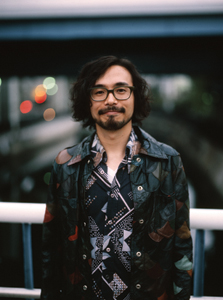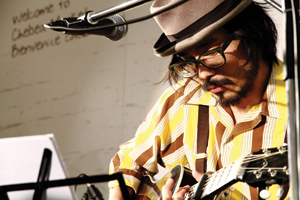Siiya Brown 椎谷ブラウン

|
Who could guess where someone with a name like that came from? So Siiya says with a smile. You could ask the same of his music. Jazz roots are evident but there are flashes of many genres, especially those grown of acoustic origins: folk, blues, bluegrass, gypsy swing, light pop. Where does it all come from? Curiosity, passion, discipline maybe…and a teacher with good taste in music. Until Siiya’s recent release of his debut album, his place in the Japanese music world would have been best described as support guitarist for other musicians, most notably Ohashi Trio. Ohashi, the popular ‘solo’ pianist with the sweet, sometimes soulful voice, actually plays multiple instruments, even on his own CDs, but needs some back-up playing live. He apparently added “Trio” in place of his first name because of his love of jazz; he noticed “trio” attached to so many jazz groups he liked and thought it would be interesting to use it himself. Siiya and Ohashi were originally classmates at Senzoku Gakuen College of Music, where they both studied jazz. But the spark that lit Siiya’s passion for jazz came years earlier. “One of my language and literature teachers in high school really liked jazz so I thought I would give it a listen. He loaned me a bunch of CDs, old Blue Note classics like Wes Montgomery and Grant Green. I was hooked after that and decided to learn jazz. Until then, I had just been practicing with classmates in band club. When I entered Senzoku, I had to go back to the basics. But the school was my launch. I built a foundation for jazz and have just been getting gradually better ever since.” Siiya took advantage of a program that allowed him to continue for two years at Berklee College of Music in Boston after two years at Senzoku. “It was a fairly smooth transition. There were classes at my level, but there were also some amazing students there, too. When I saw them performing, I was blown away.” Not having studied English much previously, Siiya took a three-month crash course before starting classes, describing that part, at least, as rough. Some of his classmates during his time at Berklee included future members of UoU, a New York based Japanese jazz group currently garnering some attention with their recent debut album. Abe Daisuke, the guitarist, was a classmate of his at Senzoku, and later became a roommate. “I enrolled in jazz studies and only practiced guitar. I was doing a lot of jazz exercises but over there, you are exposed to so many other styles…Irish, country, folk… when I heard some of those old styles, I thought ‘yeah, I like that,’ but I just absorbed it without actually playing it myself. Once I got back to Japan, I realized that I wasn’t really a jazz person and I began dabbling in other styles.” Other instruments, too–Siiya eventually learned the mandolin, pedal steel and banjo, in addition to guitar. Then, after several years with few leads, he got a call from Ohashi in 2006, asking if he would back him up on guitar. As they shared similar tastes in music, Siiya readily accepted. “Joining with him was a big influence. And I began to think, yeah, I want to start doing my own music as well.” It would be a long road, however. When asked if he’s ever had a period of struggle, Siiya laughs and says, “Like right now?” He says it as if the struggle has never ended.  “After I got back from Japan, I had nothing. I wasn’t married, I didn’t have a job. That was the hardest time. During those years before Ohashi called me, I worked part-time doing just about anything, teaching guitar, delivering stuff… I was even one of those construction area safety men waving the glowing wands. Things have been getting just barely better with time.” Siiya at least found a steady teaching gig, which evidently allowed him enough time and leisure to start recording. His wonderfully varied debut album, Mr. Guitar Gentleman, was released in early July, after a year and a half effort. “I couldn’t see the end of the tunnel at first. I only had a laptop and an interface, and recorded 80% of it myself.” Siiya got some back up on the drums from none other than Ohashi himself, as well as help from other talented musicians, especially Izawa Yoichi on steel pan. And while Siiya handled the recording and mixing, Ohashi Trio’s mastering specialist polished off the album for him. There are no vocals on the twelve-song album, but plenty of musical textures and surprises. The opening track, Mouffetard, is reminiscent of Squirrel Nut Zippers, with an unusual mix of electric swing, jazz and calypso (SNZ’s song “Hell” was a smash hit around the time Siiya went to Berklee). Siiya follows with a contemporary jazz number, “Return of the Brownie Monster,” that has an infectious guitar loop accompanied by horns, banjo and flute. “Snow Falls Softly” sounds almost contemporary classical, until the mandolin and slide guitar kick in, giving it a unique folk flavor. Halfway through the album, you realize you have no idea what’s coming next. And yet, it doesn’t feel like hodge-podge. Some kind of deeper unity abides. A many-colored style emerges. The album ends with soothing folk tune and you realize there’s not a bad song on it. Again, the question: where did this music come from? Siiya cites numerous artists he respects, including Tom Waits, Ry Cooder, Django Reinhart and of course Grant Green. Siiya Brown then reveals how he chose his mysterious stage name, “At first I thought I’d just go with my real name, but instead I dropped my first name and added Brown to my last (standard Romanization would be Shiiya with an “h”). I liked Grant Green, so I thought about a color. I struck on Brown. Siiya Brown. There’s no picture of me on the CD jacket cover. No explanation of who I am. ” But who needs an explanation? The music is explanation enough. Plenty enough. |
椎谷ブラウンって名前、どこから来たのか誰も分からないよね? と、本人が笑いながら言う。 そして音の方も国籍不明。ジャズが根底にあることは分かるが、様々なジャンルの音がちりばめられ、民族音楽、ブルース、ブルーグラス、ジプシースイング、ポップスなどからの影響が見える。旺盛な好奇心、情熱、これまでの苦労、そしていい趣味を持った先生に出会えたこと、などが合わさって今の彼の音を作っているのだろう。 彼は最近デビューアルバムを出したばかりで、それまでは大橋トリオなど、他のミュージシャンのサポートギタリストとしての活動が主だった。大橋は人気のソロピアニストで、その声質は甘く、またソウルフルであり、自身の作品ではピアノ以外にも多くの楽器を操っているが、ライブにおいてはサポートメンバーを必要としていた。大橋もジャズが大好きで、好きなジャズグループの多くが”トリオ”の名であること、そして何となく面白そうという理由で、「大橋トリオ」と名乗っている(名前通りトリオ編成という訳ではなく、大橋自身のソロユニット名)。 椎谷と大橋は洗足学園短期大学ジャズコースでクラスメートだったが、椎谷がジャズに興味を持ったのはそれよりも何年か前のことだったという。 「高校の時の国語の先生がジャズ狂で、僕も聴いてみようかなと思ったのが最初です。先生は僕にウェス・モンゴメリーやグラント・グリーンなど、古いブルーノートものをたくさん貸してくれました。それでハマってしまって、ジャズの勉強を始める決心をしました。それまでは音楽サークルでクラスメートたちとバンドをやっていました。洗足に入学して基礎から学び、そこを出発点に今まで少しずつジャズの勉強をしてきました。」 洗足で2年間学んだ後、奨学金を取得してボストンのバークリー音楽院に2年間留学した。 「バークリーへの留学は割とスムーズにいきました。バークリーには僕と同じくらいのレベルのクラスもありましたから。でも超ハイレベルの生徒も何人かいて、彼らの演奏を目の当たりにした時は本当にびっくりしました。」 特に英語に力を入れて勉強をしていたわけではなかったので、バークレー入学直前に3カ月間の英語短期集中コースを受講したが、これは結構大変だったようだ。バークレーでのクラスメートの中には、後にニューヨークを拠点に活動し最近リリースしたデビューアルバムが好評の日本人ジャズグループUoUのメンバーも含まれていた。UoUのギター、阿部大輔は洗足でもクラスメートで後にはルームメイトにもなった友人だという。 「ジャズの勉強を始めてから、ギターばかり練習していました。とにかくジャズギターの練習に明け暮れていましたが、バークレーでは様々な音楽スタイルに触れるわけです。アイリッシュ、カントリー、民族音楽・・・そういったトラッドなスタイルに触れて、そういった音楽も結構いいなと思ったのです。実際にそういった音楽を自分で演奏することはありませんでしたが、トラッドな音楽スタイルをアイデアとして自分の中に取り込んでいくことは出来ました。その後、日本に戻ってからジャズって自分らしくないと思って、ジャズ以外のスタイルも実際にプレイするようになりました。」 楽器もギター以外の弦楽器、マンドリン、ペダルスチールギター、バンジョーなども弾き始めたが、これといって表立った活動の無いまま数年が経った。そして2006年のある日、大橋から電話が掛かってきた。バックでギターを弾いて欲しいという依頼だった。音楽的な傾向は似ていたので椎谷は快くその依頼を引き受けた。 「大きな転機でした。大橋とプレイしながらやがて自分自身の音楽もやりたいと思うようになっていきました。」しかし、道のりは遠かった。苦悩した時期は無かったかと聞いてみると椎谷は「今もそうですよ!」と笑った。今までずっと苦悩し続けてきたと彼は言う。 「日本に戻って来た時、僕には何もありませんでした。独身でしたし、仕事もなく、本当に心細かった。大橋が連絡をくれるまでの数年間は色々なバイトをして日々過ごしていました。ギターを教えたり、配達の仕事とか、工事現場で誘導灯を振っていたこともあります。いつまでこんな状態が続くのだろうと不安でした。」 それでもギターを教える仕事だけは続けたおかげでアルバム製作をスタートさせることができた。色々なスタイルが詰まった彼のデビュー作『Mr. Guitar Gentleman』は1年半の製作期間を経て今年7月に発表された。 「最初は出口が見えない状態が続きました。機材はノートパソコンとインターフェイスしかなくて、録音も80%は自分一人でやりました。」 アルバムには大橋にドラマーとして参加してもらった他、スチールパンに伊沢陽一など有能なミュージシャンにも参加してもらった。 収録曲全12曲はすべてインストだが、様々な音楽的要素と仕掛けが織り交ぜられている。1曲目”Mouffetard”(ムフタール)はスクイーレル・ナット・ジッパーズを連想させる音で、スイング、ジャズ、カリプソなどの要素が詰まっている(ちょうど椎谷がバークレーに居た頃、スクイ—レルの”Hell”というカリプソナンバーが大ヒットしていた)。2曲目はコンテンポラリーなジャズナンバー”Return of the Brownie Monster”。印象的なギター・ループに管楽器、バンジョー、フルートなどが加わる。”Snow Falls Softly”は現代クラシック調と思いきや、マンドリンとスライドギターが入ってきてユニークな民族音楽調に変化する。次はどんな曲なのか想像がつかない面白さがありながら、まとまりに欠けるという感じは無く、深いところで一貫したものが流れているのを感じる。心地良いフォークのメロディーでアルバムは締めくくられていて、全体を聞き終えたとき、一曲も無駄な曲が無いことに気付くだろう。 改めて椎谷に聞いてみた。この音楽性はどこから来ているのかと。彼がリスペクトするトム・ウェイツ、ライ・クーダー、ジャンゴ・ラインハルト、そしてもちろんグラント・グリーン、これらのアーティストがルーツです、というのが椎谷の答えだった。 最後に彼は椎谷ブラウンという怪しげな芸名の秘密を明かしてくれた。「最初は本名の椎谷求(しいやもとむ)でいこうと思っていましたが、Siiyaとすることにしました(Shiiyaが正しいアルファベット表記だが、あえてそうしなかった)。そしてグラント・グリーンが大好きだったのでグリーンにあやかって僕も何かの色を名前に入れようと思い、ブラウンを思い付いてSiiya Brownという名前にしました。また、アルバムジャケットには僕の顔写真などは載せていませんし、僕がどんな人間なのかという説明も載せてはいません。」 しかしこのアルバムにアーティストの説明は要らない。音が全てを語っているのだ。  |








